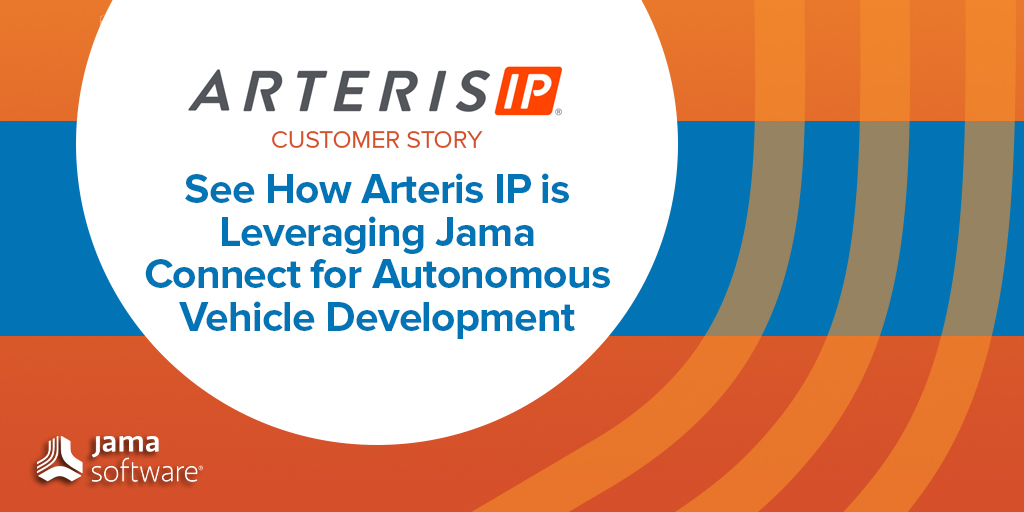
Developing autonomous vehicles requires an incredible number of moving pieces to communicate with one another. From sensors, to computers, to the automatic braking system, vehicles today require a complex system that leaves no room for error in communication.
In this blog post, we take a look at Arteris IP’s top challenges in autonomous vehicle development and why they selected Jama Connect to help.
Managing Complexities Across Remote Semiconductor IP Development
In a world of increasing automotive complexity and connectivity, developing the world’s most innovative semiconductor IP comes with a set of challenges. Arteris IP turned to Jama Software to help address these critical business challenges:
1. Adapting to Increasing Complexities in Semiconductor Development
As semiconductors get larger with more processing power and more functionality, they also become more complex and more connected. In addition to the standard complexity of semiconductor IP, Arteris IP was the first to add state-of-the-art functional safety mechanisms directly into the on-chip interconnect semiconductor IP, compounding their product development complexity.
In conjunction with their response to increasing complexity in semiconductor development, Arteris IP was also expanding their product lines from one to four, and therefore greatly increasing the number of requirements they’d need to manage.
“I find it really interesting that as the automotive industry becomes more complex, it’s becoming much riskier to base a product development process on static requirements trapped in documents. You need a living requirements thread through the end-to-end process to minimize the risk of negative outcomes and maximize productivity.”
– Kurt Shuler Vice President of Marketing Arteris IP
2. Collaborating Across Distributed Teams
With teams spread across the United States, Europe, and Asia, having clear communication and collaboration is crucial to Arteris IP’s success. The team found that sending documents and spreadsheets over email made it nearly impossible to maintain version control, and spending hours in a room reviewing requirements was not only ineffective, it was inefficient.
And while developing semiconductor IP was never an easy task, the global COVID-19 pandemic of 2020 added new challenges to Arteris IP as engineering teams shifted to be fully remote.
The challenge of engineering teams working remotely across multiple time zones made communication and collaboration even more vital, emphasizing the need for a solution that enabled everybody to collaborate seamlessly on a project virtually, regardless of physical location.
Jama Connect is our single source of truth. If it’s not in Jama Connect, it’s not happening. If it’s not in Jama Connect, it didn’t happen. When I tell people in the automotive industry we use Jama Software, they all know what it is. If you’re using anything other than Jama Software in the automotive industry, you’re going to get more questions.”
– Kurt Shuler Vice President of Marketing Arteris IP
3. Managing Document and Tracking Disparities Lacking in Traceability
With just Word Documents, email, and Excel spreadsheets, the Arteris IP team found themselves struggling to keep track of things due to the lack of traceability and a central source of information.
Macro-level traceability is key to the Arteris IP development process, and their current system did not provide end-to-end traceability — all the way from requirements to verification and validation. Atlassian Jira also played an important role in their development process, and the team needed a way to seamlessly link requirements to Jira and keep those in sync as things shifted.
As an innovative leader in the automotive industry, other organizations were looking to Arteris IP for guidance on development processes, quality management, and adherence to ISO 26262. They knew there must be a better way than spreadsheets and documents.
RELATED: Watch a demonstration of the Jama Connect for Automotive Solution
4. Proving Compliance and Providing an Audit Trail
With many of the most important Arteris IP clients being in the automotive industry, and some also in aerospace and industrial machinery, meeting regulatory standards is a critical challenge for the organization. ISO 26262 is the most important functional safety standard for Arteris IP, and proving compliance is critical. And as previously mentioned, their current solution did not provide the level of traceability necessary to prove compliance with ISO 26262.
The team needed a solution that both enables traceability and helps demonstrate that functional safety standards and industry regulations like ISO 26262 have been met during the development process.
Arteris IP Selects Jama Connect to help Develop Connected Semiconductor IP for Autonomous Vehicle Development
After considering all market options, including IBM® DOORS® Next Generation, Arteris IP selected Jama Connect as their requirements, risk, and test management solution. The decision, Kurt Shuler, VP of Marketing, said, ultimately came down to the semiconductor and automotive industry’s trust in Jama Software as an industry-leading solution.
He explained that after speaking with many of his semiconductor company and automotive Tier-1 customers, the majority of whom were replacing their outdated, legacy systems and adopting Jama Connect, he knew this was the right path for Arteris IP.
Download the full customer story to see how Jama Connect helped Arteris IP manage the complexity of developing highly sophisticated semiconductor IP by simplifying their requirements management and review processes and improving communication and visibility across distributed teams.
Read the full customer story to see how Jama Connect helps industry leader Arteris IP with autonomous vehicle development.
- Tackling Industrial Manufacturing’s Biggest Challenges: Solutions That Work - October 24, 2024
- How to Overcome Development Challenges: Collaboration & Alignment in Complex Product, Systems, and Software Development - August 13, 2024
- How to Overcome Development Challenges: Proving Regulatory Compliance in Complex Product and Systems Development - July 24, 2024